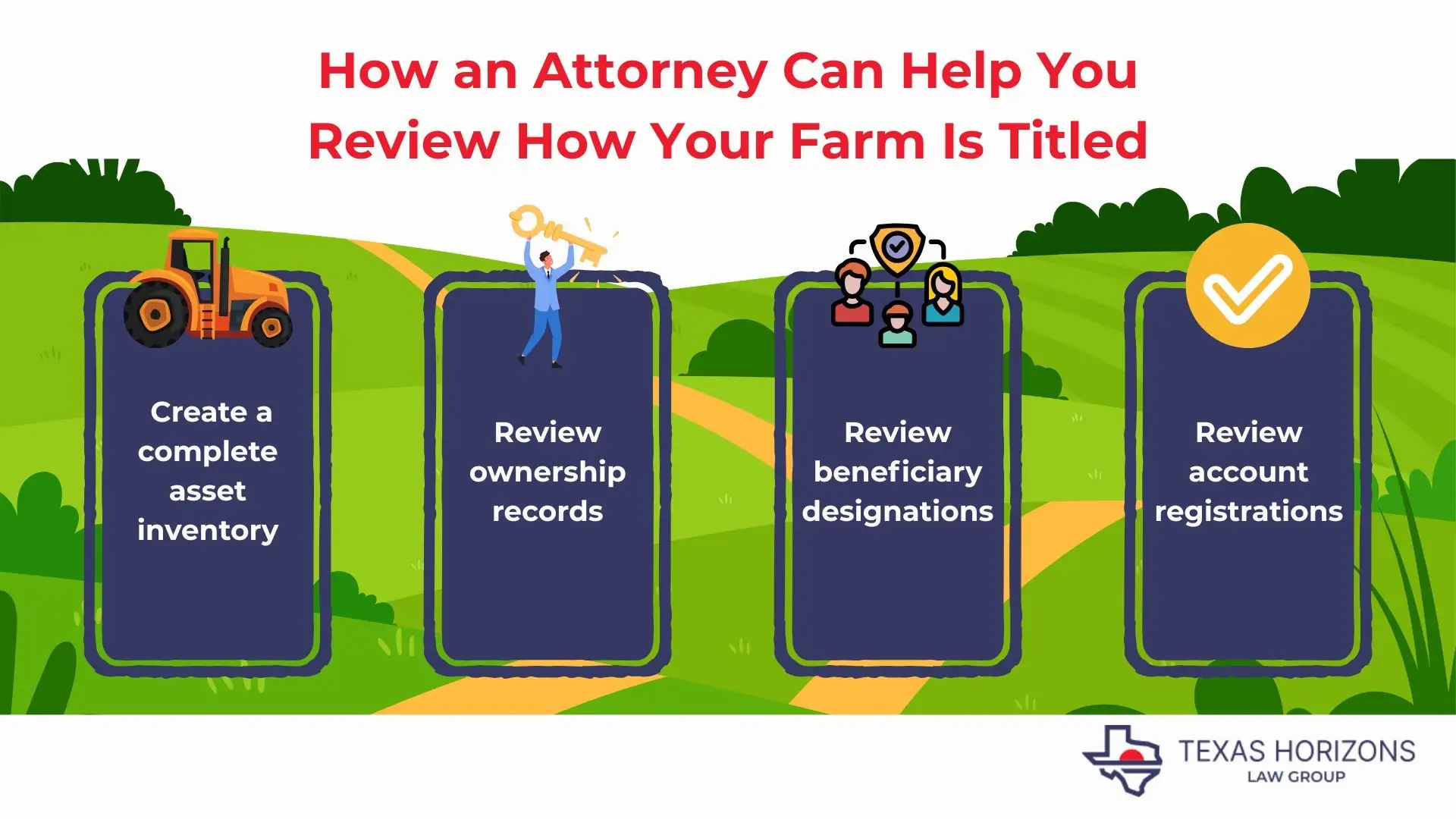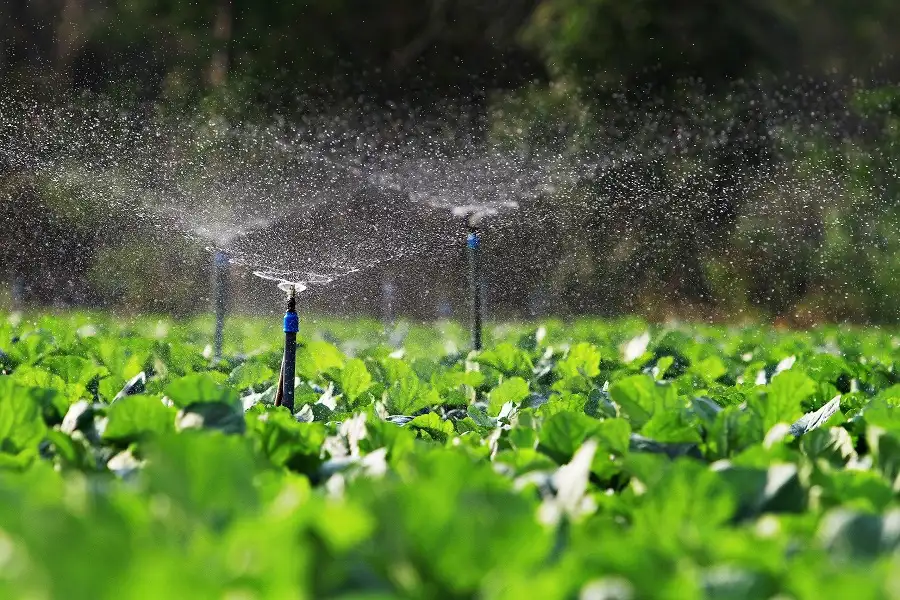Working with farmers across South Central Texas, our Seguin & New Braunfels estate planning attorneys have seen firsthand how much heart and soul go into building a successful farming or ranching business. Your farm isn't just land and equipment — it's your heritage, your family's livelihood, and the legacy you hope to pass down to your children and grandchildren.
Unfortunately, many farmers put off estate planning or make critical mistakes that can threaten everything they've worked so hard to build. In this guide, we'll walk through the most common mistakes that can cause family farm inheritance problems and share practical solutions to help protect your family business for generations to come.
1. Dying Without a Will (Intestacy)

Mistake: Many farmers pass away without a will, leaving their estate to be divided according to state intestacy laws. These default rules rarely match what the farmer would have wanted, especially for something as complex as a family farm.
What to do: As soon as possible, create a basic will at a minimum. A will gives you control over who inherits your farmland, equipment, livestock, and other assets. Without this essential document, the state — not you — decides who gets what, potentially forcing the division or sale of property that's been in your family for generations.
Texas law insight: In Texas, if you die without a will, state law determines who gets your property, and it may not align with your wishes. Under Texas intestacy laws, if you're married with children that are only from that marriage, your spouse gets all community property and one-third of your separate personal property, while your children receive everything else. This can force fractionalized ownership of farmland, making continued operations difficult or impossible.
2. Asset Ownership Inconsistent with Estate Plan
Mistake: Having estate planning documents that say one thing while your asset titles tell a different story. For example, your will might leave your farm to all your children equally, but if your bank accounts are jointly owned with just one child, those accounts pass directly to that child regardless of what your will says.

What to do: Review how your property is actually titled and make sure it aligns with your estate plan. An estate planning attorney can help you create a complete inventory of your assets and verify that ownership records, beneficiary designations, and account registrations support your overall plan, not contradict it.
3. Unintended Inheritance Outcomes
Mistake: In second marriages or blended families, many farmers leave everything to their spouse, assuming their children will eventually inherit. However, without proper planning, a surviving spouse is free to change the plan completely, potentially leaving their stepchildren with nothing.
What to do: Consider using trusts to protect all heirs. A well-structured trust can secure your current spouse's financial well-being throughout their life, guaranteeing that your children from a previous marriage will still receive their designated inheritance. This approach helps prevent family conflict while ensuring everyone is treated fairly.
4. Inadequate Tax Planning
Mistake: Underestimating the potential tax burden your heirs might face. With farm land values rising dramatically in recent years, many farmers don't realize their estates now exceed federal or state tax exemption thresholds.
What to do: Work with professionals who understand both farming and tax planning. There are specialized exemptions and deductions available for farms, including installment payment options for the federal estate tax. Our exceptional estate planning attorney can help you explore strategies like creating life insurance trusts or family limited liability companies to minimize tax implications.
Texas law insight: While Texas has no state estate tax, federal estate taxes still apply. For 2025, the federal estate tax exemption is $13.99 million per person, with amounts over this threshold taxed at 40%. However, this exemption is due to decrease to around $7 million in 2026 unless Congress acts. Farm families should note that special provisions like IRC Section 6166 allow qualifying farm estates to pay estate taxes in installments over 14 years.
5. Overlooking Family Dynamics
Mistake: Not having honest conversations about which family members actually want to farm. Many farm families assume certain children will take over the operation, only to discover after the farmer's death that nobody wants to continue, or conflicts arise between those who do and don't want to farm.
What to do: Have open family discussions about everyone's true wishes. Some children may have devoted their lives to the farm, while others pursued different paths. Treating them equally doesn't necessarily mean giving them identical assets. Consider leaving the farm business to those who want to continue farming, while providing other assets to non-farming children.
6. Equal Distribution vs. Fair Distribution
Mistake: Dividing farm assets equally among all children without considering their contributions or interests. This often leads to one child trying to farm while paying rent to siblings who expect income without understanding the challenges of the business.
What to do: Create a plan that's fair without necessarily being equal. For the child who's committed to farming, consider giving them operational control through business structures like an LLC, while ensuring other family members receive appropriate financial benefits. You might also consider using life insurance to provide cash to non-farming heirs while the farm itself goes to those who will continue the operation.
Texas law insight: Texas law permits unequal distributions of assets in an estate plan, allowing farmers to create succession plans that favor children who are actively involved in the farming operation while providing other types of assets to non-farming heirs.
7. Inappropriate Choice of Representatives
Mistake: Automatically naming your oldest child or spouse as trustee or executor without considering whether they have the skills, time, or temperament for the job.
What to do: Choose representatives based on ability, not just family position. The best person to manage your estate might be someone who's organized, fair-minded, and good at communicating with all family members. If naming one child might cause tension among siblings, consider appointing a neutral third party or professional trustee.
8. Insufficient Disability Planning

Mistake: Creating a plan that addresses what happens after you die but ignores what happens if you cannot manage the farm due to illness or injury.
What to do: Include powers of attorney and advance directives in your planning. These documents allow trusted individuals to make financial and healthcare decisions if you can't. For farmers, it's crucial to include specific provisions about farm management — who will make planting decisions, handle equipment, care for livestock, and manage employees if you're temporarily or permanently incapacitated.
9. Non-Binding Instructions
Mistake: Leaving vague guidance about how you'd "like" things handled instead of creating legally binding instructions.
What to do: Be specific and make your intentions legally enforceable. If you want certain farmland to remain in agricultural use, specific equipment to go to a particular child, or personal effects distributed in a certain way, don't leave it to chance. Make these directives binding in your estate planning documents to prevent misunderstandings and family disagreements.
10. Lack of Liquidity Planning
Mistake: Not planning for the significant costs and cash needs that arise after a farmer's death. Even a valuable farm can face a liquidity crisis if there's no readily available cash to pay funeral expenses, settle debts, pay taxes, and keep the operation running.
What to do: Create a liquidity plan. Life insurance is often the simplest solution, providing immediate cash when needed most. Other options include securing lines of credit, establishing reserve funds, or structuring your estate plan to qualify for special payment provisions for farm estates. Without adequate liquidity, your heirs might be forced to quickly sell land, equipment, or livestock at below-market prices.
Texas law insight: In Texas, funeral expenses, administration costs, and certain debts must be paid before assets can be distributed to heirs. Without proper liquidity planning, farm assets may need to be sold quickly to satisfy these obligations.
11. Problematic Joint Property Ownership

Mistake: Adding children to property deeds to avoid probate, without understanding the risks. While this approach does avoid probate, it creates significant problems if the child gets divorced, faces creditor claims, or dies before the parent.
What to do: Consider better alternatives to joint ownership. Revocable living trusts can avoid probate while protecting assets from your children's potential creditors or divorce proceedings. Limited liability companies can provide additional liability protection while facilitating orderly transfers of ownership and management.
Texas law insight: In Texas, property held in joint tenancy with rights of survivorship passes automatically to the surviving owner(s), avoiding probate. However, this arrangement exposes the property to each owner's creditors and can create gift tax issues when adding a child to a deed.
12. Farm Value Underestimation
Mistake: Farmers often think, "I'm not wealthy enough to worry about estate taxes," without realizing how valuable their land has become. With farm land in some areas selling for about $10,000 per acre (for example, currently, $9,615 in the Gulf Coast–Brazos Bottom region), even modest-sized farms can exceed estate tax exemption thresholds.
What to do: Get regular professional appraisals of your farm property and stay informed about current exemption amounts. Work with an estate planning attorney who understands the unique aspects of farm valuation and can help you develop strategies to address potential tax liability before it becomes a problem.
13. Using Another Farm's Plan as a Template
Mistake: Assuming what worked for another farm family will work for yours. Every farm family has unique circumstances, goals, and family dynamics that require a customized approach.
What to do: Seek advice from professionals experienced in farm estate planning, but recognize that your plan needs to be tailored to your specific situation. A strategy that worked perfectly for your neighbor might be completely wrong for your family based on differences in farm size, type of operation, family structure, or financial situation.
14. Life Estate Misunderstandings

Mistake: Giving away remainder interests in property while retaining a life estate, thinking this will avoid estate taxes while maintaining control and income.
What to do: Understand the tax implications before creating a life estate. While this arrangement may avoid probate, it typically doesn't provide the tax benefits many farmers expect. Consider alternative strategies like specialized trusts that can provide both control during your lifetime and potential tax advantages.
Texas law insight: In Texas, life estates can be created by deed or will, but they may not achieve the tax benefits many farmers expect. Under current federal tax law, property transferred with a retained life estate is generally still included in the taxable estate.
15. Neglecting Plan Updates
Mistake: Creating an estate plan but never reviewing or updating it as circumstances change. Tax laws, family situations, and farm operations all evolve over time, and an outdated plan may no longer accomplish your goals.
What to do: Review your estate plan regularly — at least every 3–5 years or whenever major changes occur in tax law or your family situation. Schedule periodic meetings with your estate planning attorney to ensure your plan still reflects your wishes and works with current laws.


